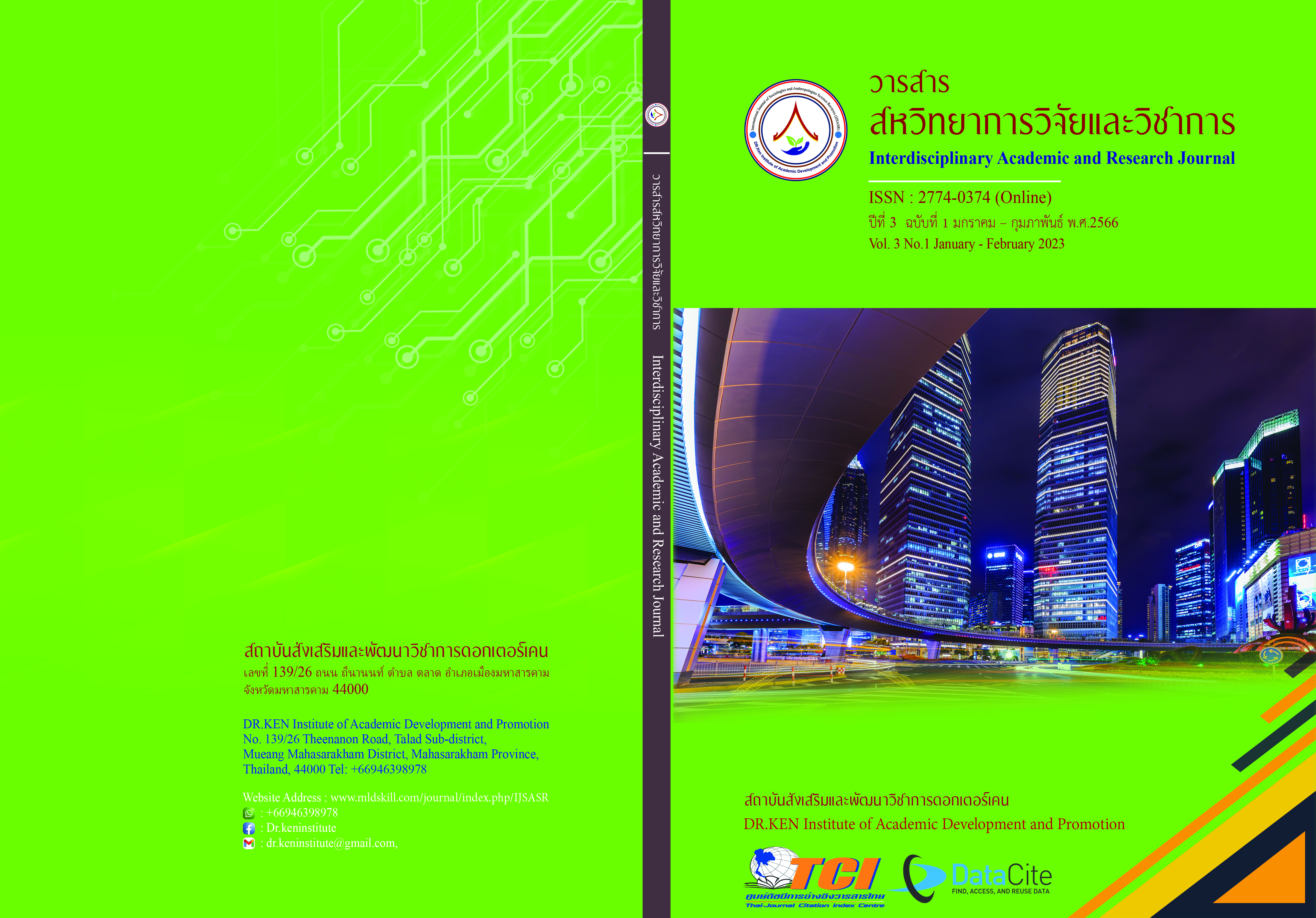School Administrators' Transformational Leadership of the Opportunities Expands School under the Bueng Kan Primary Educational Service Area Office
DOI:
https://doi.org/10.14456/iarj.2023.33Keywords:
Leadership; , Transformation; , Opportunity Extension SchoolAbstract
Nowadays, there is a rapid change, administrators have to develop themselves to keep up with the changes that occur. There is a systematic management within the school that makes teachers accepted and respected. Including interacting well with colleagues and helping others to achieve their desired goals. Transformational leadership encourages practitioners to realize the importance and value of the goals that must be adhered to and adhered to in order to improve the quality of education for learners. Therefore, this research aims to (1) study the transformational leadership of school administrators. And (2) to compare the level of opinions of personnel toward the transformational leadership of school administrators classified by sex, education level, and responsible work group. The research population consisted of 962 personnel of the Opportunity Expansion School under Bueng Kan Primary Educational Service Area Office and a sample of 275 people. Collect research data using questionnaires for data analysis. The statistics used in the research were frequency, percentage, mean, standard deviation, t-test, F-test. The results showed that: (1) The overall transformational leadership of school administrators was at a high level. (2) The results of the comparative analysis of the opinions towards the transformational leadership of school administrators classified by gender and the group responsible for both overall and individual aspects were not different. However, classified by level of education, the overall difference was statistically significant at the .05 level.
References
กฤศ กำเนิดติณห์กุลธร. (2562). ปัจจัยภาวะผู้นำการเปลี่ยนแปลงที่ส่งผลต่อผลการปฏิบัติงานของพนักงานเทศบาลเมืองเขารูปช้าง อำเภอเมือง จังหวัดสงขลา. ศึกษาศาสตรมหาบัณฑิตภาควิชาการบริหารการศึกษา : มหาวิทยาลัยทักษิณ.
จันทร์เพ็ญ ชูเพชร. (2563). การศึกษาปัจจัยด้านภาวะผู้นำการเปลี่ยนแปลงที่ส่งผลต่อความผูกพันต่อองค์กรของธุรกิจพลังงานของพนักงานบริษัทผลิตพลังงานไฟฟ้าองค์กรมหาชนแห่งหนึ่งในประเทศไทย.ปริญญาการจัดการมหาบัณฑิต : มหาวิทยาลัยมหิดล.
นุช สัทธาฉัตรมงคล. (2559). ผู้นำการเปลี่ยนแปลงในยุคโลกาภิวัตน์สู่การพัฒนาอย่างยั่งยืน. วารสารธุรกิจปริทัศน์. 8(1), 167 – 182.
บุญชม ศรีสะอาด. (2553). การวิจัยเบื้องต้น. กรุงเทพฯ: สุวีริยาสาส์น.
รัตติยา จันทร์เอียด. (2561). ภาวะผู้นำการเปลี่ยนแปลงของผู้บริหารสถานศึกษาที่ส่งผลต่อการเป็นองค์การแห่งการเรียนรู้ของสถานศึกษา สังกัดสำนักงานเขตพื้นที่การศึกษา มัธยมศึกษา เขต 11ในจังหวัดสุราษฎร์ธานี. ครุศาสตรมหาบัณฑิต สาขาวิชาการบริหารการศึกษา: มหาวิทยาลัยราชภัฏสุราษฎร์ธานี.
วัลลภ โพธิ์ไทย. (2565). ความสัมพันธ์ระหว่างภาวะผู้นำการเปลี่ยนแปลงกับประสิทธิผลการบริหารสถานศึกษาขั้นพื้นฐาน. วารสารนวัตกรรมการบริหารการศึกษา. 1(1), 10 – 20.
อรวรรณ ภัทรดำเนินสุข. (2564). ภาวะผู้นำการเปลี่ยนแปลงของผู้บริหารกับแรงจูงใจในการปฏิบัติงานของครูในสถานศึกษาสังกัดสำนักงานเขตพื้นที่การศึกษาประถมศึกษาสมุทรสงคราม. ศึกษาศาสตรมหาบัณฑิต ภาควิชาการบริหารการศึกษา. กรุงเทพฯ : มหาวิทยาลัยศิลปากร.
Bass, B.M., & Avolio, B.J. (1990), "Developing Transformational Leadership: 1992 and Beyond", Journal of European Industrial Training, 14 (5), https://doi.org/10.1108/03090599010135122
Krejcie, R. V. & Morgan, D. W. (1970). Determining Sample Size for Research Activities. Educational and Psychological Measurement, 30(3), 607-610.
Yukl, G.A. (1998). Leadership in Organization. 4th ed. Englewood Cliffs, NJ : Prentice Hall.
Downloads
Published
How to Cite
Issue
Section
License
Copyright (c) 2023 Chayada Aekaresa

This work is licensed under a Creative Commons Attribution-NonCommercial-NoDerivatives 4.0 International License.
Copyright on any article in the Interdisciplinary Academic and Research Journal is retained by the author(s) under the under the Creative Commons Attribution-NonCommercial-NoDerivatives 4.0 International License. Permission to use text, content, images, etc. of publication. Any user to read, download, copy, distribute, print, search, or link to the full texts of articles, crawl them for indexing, pass them as data to software, or use them for any other lawful purpose. But do not use it for commercial use or with the intent to benefit any business.
















.png)


